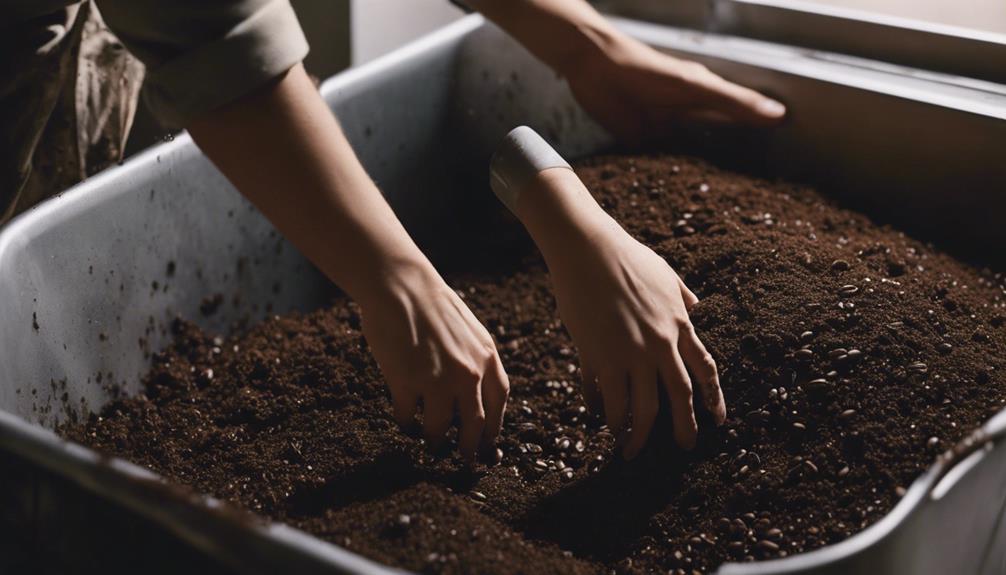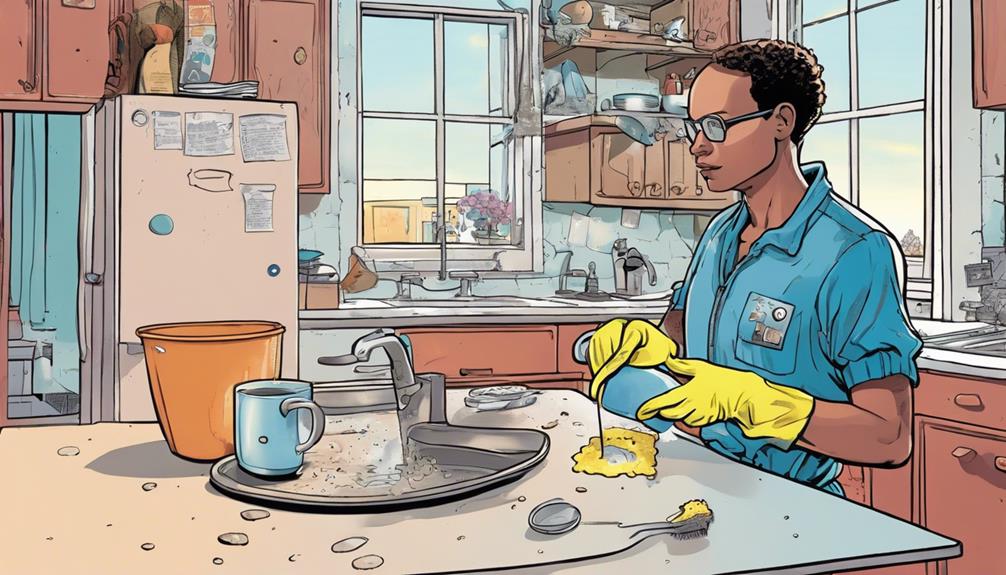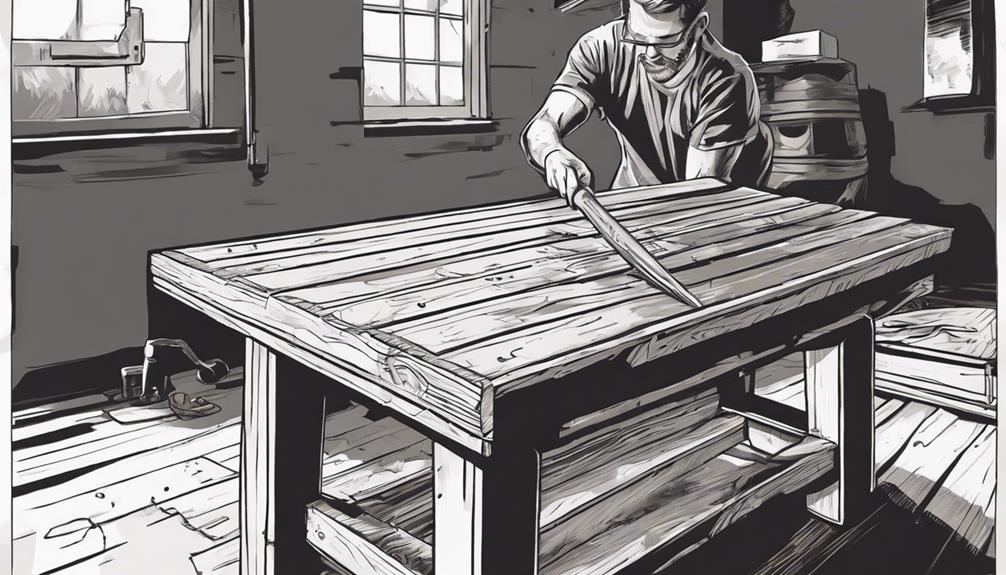In order to avoid clogging in your pipes, refrain from pouring coffee grounds down the drain as they can lead to plumbing issues. Instead, consider repurposing them for sustainable practices such as composting or using them as a natural insect repellent in your garden. By opting out of disposing them in the sink, you reduce the risk of blockages and keep your plumbing system running smoothly. Reusing coffee grounds for other purposes not only benefits your plants but also the environment. By embracing these alternatives, you ensure the functionality of your drainage system while making a positive impact on your surroundings. For more tips on effectively managing coffee grounds, check out additional insights here.
Key Takeaways
- Dispose of grounds in compost or trash to prevent drain clogs.
- Avoid rinsing grounds down the sink to maintain plumbing health.
- Utilize sink strainers to catch coffee grounds and prevent blockages.
- Implement routine drain cleaning to prevent build-up from coffee grounds.
- Opt for eco-friendly disposal methods like composting to avoid plumbing issues.
Alternative Uses for Coffee Grounds
Moreover, when considering alternative uses for coffee grounds, you'll find a variety of practical and eco-friendly options to explore.
One key aspect to remember is to avoid putting coffee grounds down your plumbing or drains. Coffee grounds can create blockages in pipes due to their texture, potentially leading to costly plumbing issues.
Instead, consider utilizing coffee grounds in more beneficial ways such as using them as fertilizer for plants to enhance growth and soil quality. Another useful method is to mix coffee grounds with water to create a natural exfoliator for your skin care routine.
Additionally, you can sprinkle coffee grounds in outdoor areas to act as a natural insect or flea repellent. Moreover, adding coffee grounds to your compost pile can improve its richness and nutrient content, benefiting your gardening endeavors.
Composting Coffee Grounds
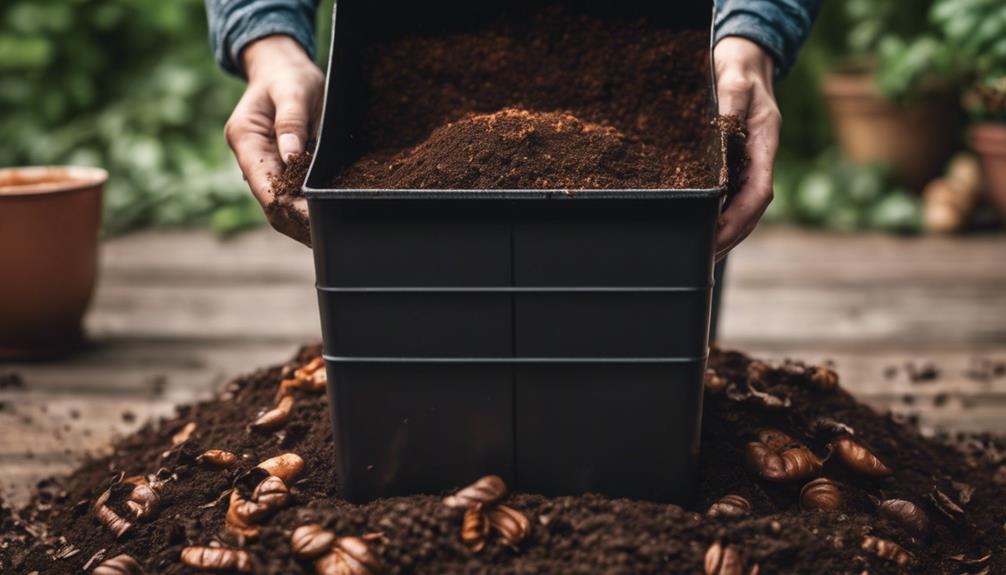
Composting coffee grounds enriches soil with essential nutrients and enhances overall soil health. When you compost coffee grounds, you provide your soil with valuable elements like nitrogen and potassium, important for plant growth. The structure, aeration, and water retention of the soil also benefit from incorporating coffee grounds into compost. Additionally, adding coffee grounds attracts beneficial earthworms, which further improve soil health. These grounds act as a natural fertilizer, promoting plant vitality and growth. By composting coffee grounds, you engage in sustainable gardening practices, reducing waste and supporting a healthier environment. Check out the table below for a quick overview of the benefits of composting coffee grounds:
| Benefits of Composting Coffee Grounds |
|---|
| Enriches soil with essential nutrients |
| Improves soil structure and water retention |
| Attracts beneficial earthworms |
| Acts as a natural fertilizer for plants |
Garden Mulch With Coffee Grounds
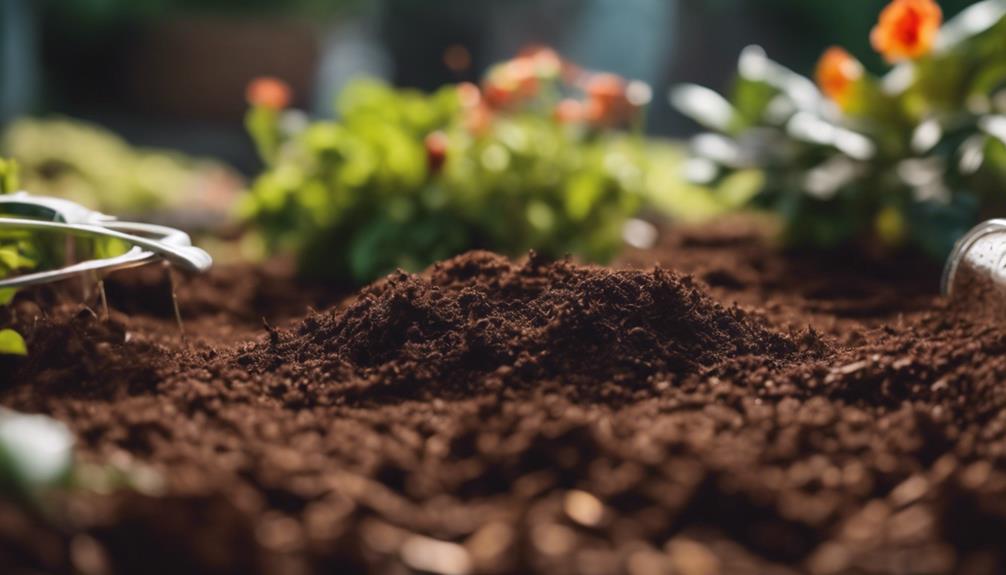
Using coffee grounds as garden mulch can offer numerous benefits to your plants. The grounds help retain moisture, provide essential nutrients, and even deter pests like slugs and snails.
Mulching Benefits Plants
Mulching your garden with coffee grounds provides numerous benefits to plants, enhancing soil quality and promoting healthy growth.
Here are three key advantages of using coffee ground garden mulch:
- Nutrient Enrichment: Coffee grounds are rich in essential nutrients like nitrogen, potassium, and phosphorus, which are crucial for plant growth and development. When used as mulch, they gradually release these nutrients into the soil, providing a natural and sustainable source of nourishment for your plants.
- Soil Improvement: By incorporating coffee grounds as mulch, you can enhance soil structure, increase moisture retention, and improve aeration. This creates a conducive environment for root growth, leading to healthier and more robust plants in your garden.
- Acid-Loving Plant Support: The natural acidity of coffee grounds is beneficial for plants that thrive in acidic soil, such as azaleas, rhododendrons, and blueberries. Mulching with coffee grounds can help maintain the best pH levels for these acid-loving plants, supporting their growth and overall health.
Coffee Grounds as Mulch
Enhancing your garden's soil quality and nourishing your plants can be effectively achieved by utilizing coffee grounds as mulch. Coffee grounds, when used as garden mulch, not only improve soil quality but also provide essential nutrients for plant growth.
One significant benefit of mulching with coffee grounds is their ability to retain moisture in the soil, promoting healthy root development and reducing water loss through evaporation. Additionally, coffee grounds act as a natural weed suppressant, helping to keep unwanted plants at bay.
For those with acid-loving plants such as roses, azaleas, and blueberries, coffee grounds are particularly beneficial due to their acidity. By incorporating coffee grounds into your garden mulch, you can create a favorable environment for these plants to thrive.
Whether spread directly onto the soil or composted for later use, using coffee grounds as mulch is an eco-friendly way to recycle waste and enhance the productivity of your garden. Consider incorporating coffee grounds into your gardening routine to reap these benefits and promote a healthy, thriving garden.
Applying Coffee Mulch
To effectively apply coffee mulch in your garden, consider spreading a layer of coffee grounds around the base of your plants.
Here are three key benefits of using coffee grounds as garden mulch:
- Improving Soil Quality: Coffee mulch adds valuable organic matter to the soil, enhancing nutrient levels that are essential for healthy plant growth.
- Sustainable Gardening: By using coffee grounds as mulch, you can reduce the reliance on chemical fertilizers, promoting sustainable gardening practices that are beneficial for both plants and the environment.
- Benefiting Acid-Loving Plants: The acidity of coffee grounds is particularly advantageous for acid-loving plants like blueberries, azaleas, and rhododendrons. When used as mulch, coffee grounds can create an ideal environment for these plants to thrive.
Hand and Facial Scrub Ideas
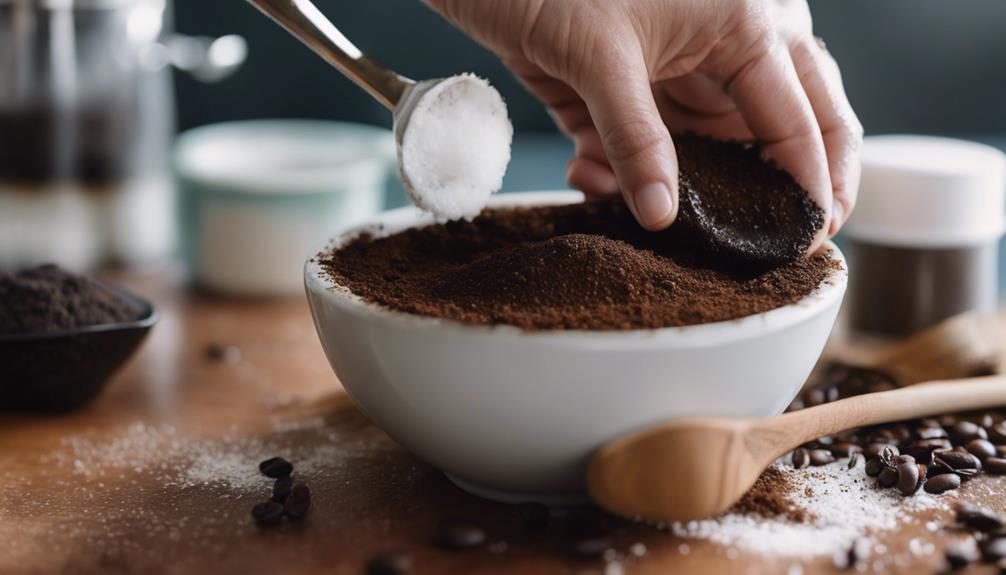
For smooth and rejuvenated skin, consider trying out these coffee ground-based hand and facial scrub ideas. Coffee grounds are excellent for exfoliating dead skin cells, promoting circulation, and potentially reducing cellulite. Here are some simple DIY scrub recipes using coffee grounds:
| Scrub Type | Ingredients | Benefits |
|---|---|---|
| Hand Scrub | Coffee Grounds + Coconut Oil | Smoother hands with improved texture |
| Facial Scrub | Coffee Grounds + Honey + Yogurt | Brighter and exfoliated facial skin |
| Exfoliating Scrub | Coffee Grounds + Sugar + Olive Oil | Gentle exfoliation for softer skin |
These scrubs can help revitalize your skin, leaving you feeling refreshed and glowing. The texture of coffee grounds provides the perfect amount of abrasion for effective exfoliation, revealing healthier skin underneath. Consider incorporating these coffee ground scrubs into your skincare routine for a natural and rejuvenating experience.
Preventing Drain Blockages
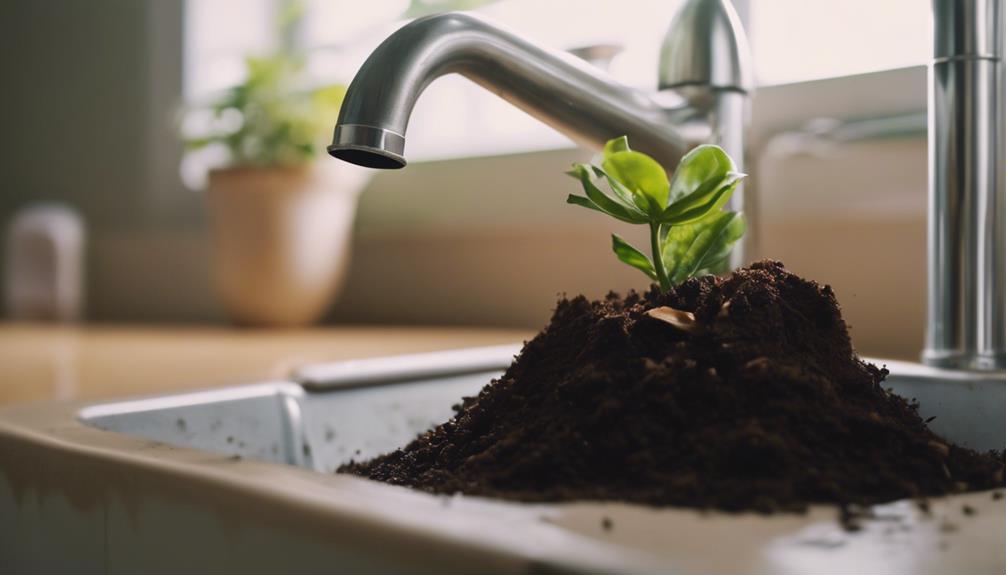
Dispose of coffee grounds properly to prevent drain blockages. Here are three essential tips to help you avoid clogs and keep your drains running smoothly: First, never pour coffee grounds down the sink, as they can quickly accumulate and create a sludgy mess that can clog your pipes. Instead, consider composting them or throwing them in the trash. Another option is to mix the coffee grounds with other organic materials, such as vegetable peels or eggshells, before disposing of them. Following these coffee grounds disposal tips will help you maintain a healthy and clog-free drainage system in your home.
- Use a Sink Strainer: Placing a sink strainer over your drain can effectively trap coffee grounds and prevent them from entering the pipes. This simple tool is a great way to catch debris before it causes any blockages.
- Regularly Clean the Drain: Make it a habit to clean your drain regularly to remove any buildup of coffee grounds and other substances. By keeping your drain clean, you can prevent blockages from forming in the first place.
- Flush with Hot Water: Pouring hot water down the drain can help dissolve minor blockages caused by coffee grounds. This simple and effective method can clear your pipes and prevent more significant issues from developing.
Avoiding Garbage Disposal Damage
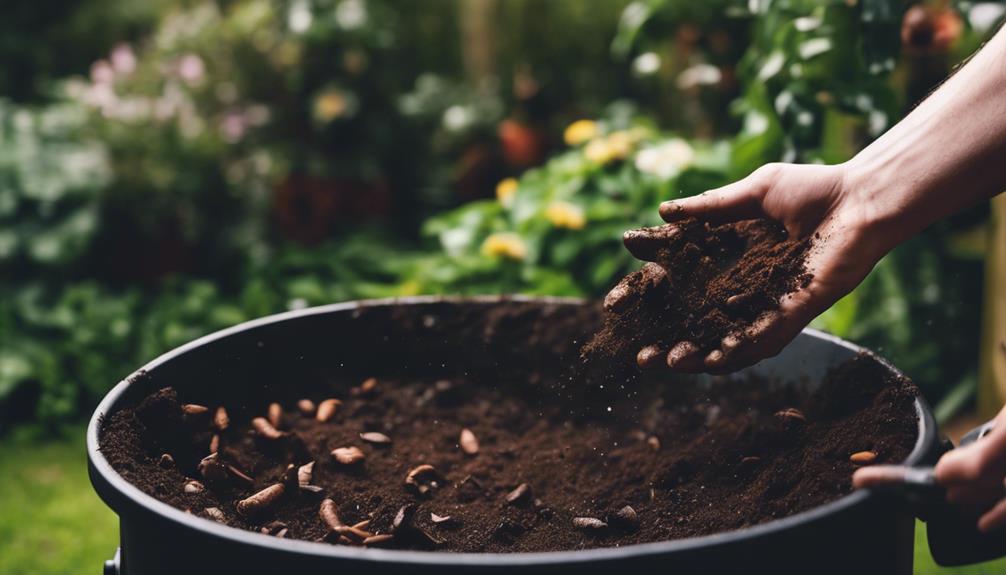
Coffee grounds pose a threat to your garbage disposal system, potentially leading to damage and blockages if not disposed of properly. When you put coffee grounds down the garbage disposal, they can accumulate and form a thick paste that clogs pipes and damages the blades of the disposal unit. Grinding up coffee can seem convenient, but it's best to avoid putting coffee grounds in the garbage disposal to prevent costly repairs and maintain the functionality of your system.
Properly disposing of coffee grounds by throwing them in the trash or compost can help you avoid clogged pipes and prevent drain blockages. By preventing coffee grounds from entering the disposal, you can save yourself from potential plumbing nightmares and safeguard the longevity of your garbage disposal unit. Remember, a little extra effort to dispose of coffee grounds correctly can go a long way in keeping your garbage disposal system in good condition.
Sustainable Coffee Ground Disposal
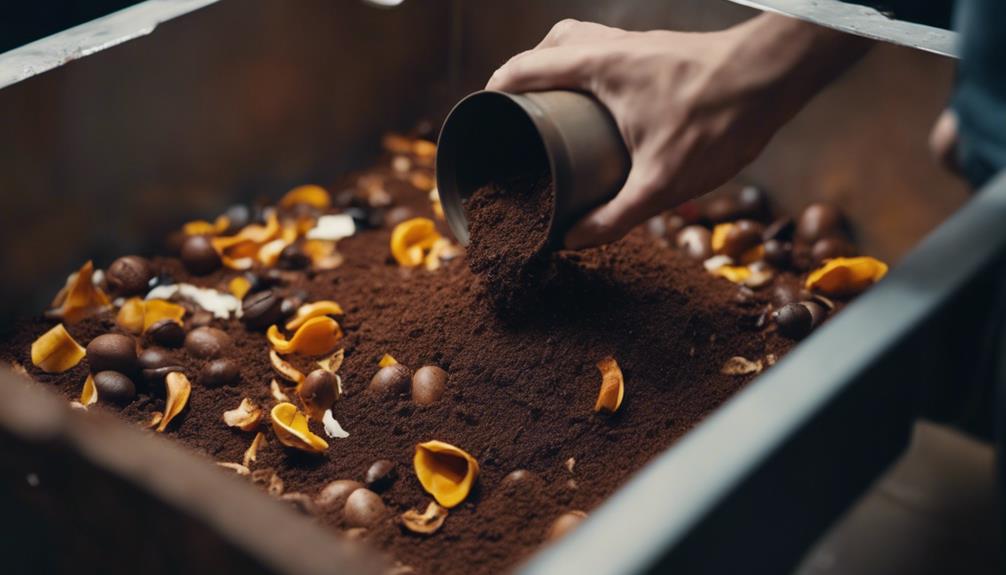
Consider utilizing coffee grounds in a sustainable manner to benefit both your garden and the environment. Instead of putting used coffee grounds in the trash or down the sink, there are eco-friendly ways to repurpose them that can help reduce waste and promote sustainability.
Here are three ways to make the most of your coffee grounds:
- Composting: Mix coffee grounds with other organic materials like fruit and vegetable scraps to create nutrient-rich compost for your garden. This natural fertilizer can help improve soil quality and promote plant growth.
- Mulching: Spread a layer of coffee grounds around plants in your garden to help retain moisture, suppress weeds, and provide essential nutrients to the soil. This can also reduce the need for watering, conserving water resources.
- Repelling Pests: Coffee grounds can act as a natural deterrent for pests like slugs and snails. Creating a barrier of coffee grounds around vulnerable plants can help protect them without harming the environment.
Healthy Plumbing Practices
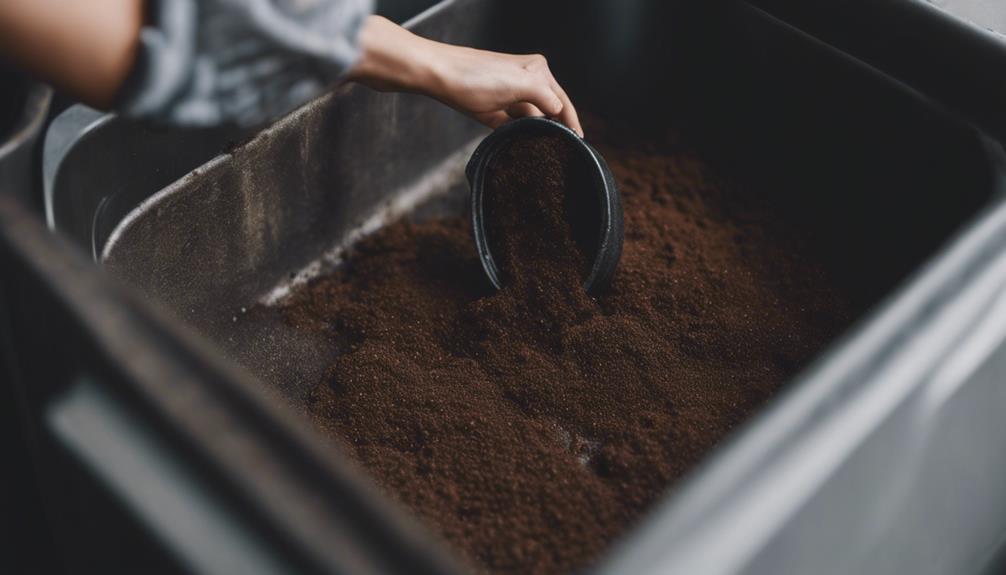
You can prevent drain clogs and maintain eco-friendly practices by avoiding the disposal of coffee grounds down your sink.
Opt for eco-friendly disposal options such as composting or throwing coffee grounds in the trash to keep your plumbing healthy and free from blockages.
Implementing these simple habits can save you from plumbing issues and costly repairs in the long run.
Prevent Drain Clogs
To maintain healthy plumbing and prevent drain clogs, make sure you dispose of coffee grounds properly and avoid letting them go down the sink.
Here are three essential tips to help you prevent drain blockages:
- Use Sink Strainers: Place sink strainers over your drains to catch any coffee grounds or food debris before they can go down the pipes. This simple tool can prevent clogs and keep your plumbing system running smoothly.
- Regular Drain Cleaning: Implement a routine drain cleaning schedule using safe methods like hot water or vinegar to flush out any potential build-up of coffee grounds or other substances. This proactive approach can help you avoid costly plumbing repairs in the future.
- Avoid Food Debris: In addition to coffee grounds, make sure to avoid putting any food debris down the sink. This practice can help prevent clogged drains and maintain the overall health of your plumbing system.
Eco-Friendly Disposal Options
Properly disposing of coffee grounds in eco-friendly ways is essential for maintaining healthy plumbing practices and preventing drain blockages. When it comes to eco-friendly disposal options, avoid rinsing used coffee grounds down the drain as they can accumulate and lead to clogs.
Instead, consider throwing them in the trash or compost bin. Repurposing coffee grounds as compost for your garden isn't only vital for the environment but also beneficial for your plants. As organic materials, coffee grounds can help improve soil quality and provide essential nutrients to support plant growth.
Moreover, using coffee grounds in the garden can absorb odors in the trash or compost, making them a useful and sustainable disposal option. Remember, grinding food waste like coffee grounds can be convenient, but it's important to dispose of them responsibly to prevent drain blockages.
Frequently Asked Questions
How to Get Rid of Coffee Grounds in the Drain?
When it comes to disposing of coffee grounds, avoid pouring them down the drain. Instead, opt for composting or using them as a natural exfoliator.
Flushing coffee grounds down the garbage disposal can lead to clogs and damage. Safely dispose of grounds in the trash or let them dry before throwing them away to prevent drain blockages.
Proper disposal helps maintain clear drains and avoids costly plumbing issues.
Do Coffee Grounds Really Clog Drains?
Yes, coffee grounds can indeed clog drains. Their sedimentary nature and texture make them prone to accumulation in pipes, leading to blockages over time.
Flushing coffee grounds down drains can result in plumbing nightmares, causing thick sludge buildup that's challenging to clear. To prevent costly repairs and plumbing issues, it's essential to avoid disposing of coffee grounds down the drain and opt for alternative disposal methods.
What Will Dissolve Coffee Grounds?
To dissolve coffee grounds effectively, consider using boiling water. Boiling water breaks down the grounds. Another option is baking soda, whose abrasiveness helps in breaking down the grounds. White vinegar can act as a natural cleaner to dissolve the coffee grounds. Enzyme-based drain cleaners specifically target organic matter, making them another effective option. A mixture of salt, baking soda, and vinegar can also be a potent solution for dissolving coffee grounds. Use these methods to prevent drain blockages caused by coffee grounds.
Will Coffee Grounds Clog a Toilet?
Flushing coffee grounds down a toilet can indeed lead to clogs. When coffee grounds accumulate in pipes, they form a dense mass that can block the plumbing system.
This sedimentary nature makes them particularly troublesome for toilet drainage. To prevent such issues, always dispose of coffee grounds in the trash rather than down the toilet, ensuring smooth plumbing operation and avoiding costly repairs.
Conclusion
To sum up, coffee grounds can be repurposed in various ways to prevent drain blockages and promote sustainability. By composting, using as garden mulch, or creating scrubs, you can avoid clogs and keep your plumbing in good condition.
Remember to never dispose of coffee grounds down the drain or garbage disposal to prevent potential damage. By following these practices, you can guarantee a healthy and environmentally friendly disposal of coffee grounds.
Remember, 'One person's waste is another's treasure.'
